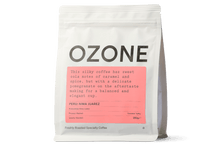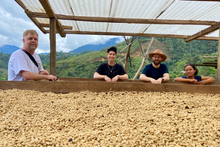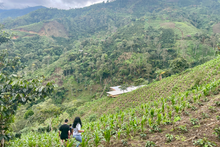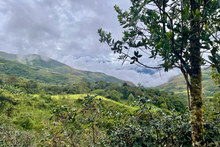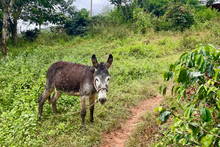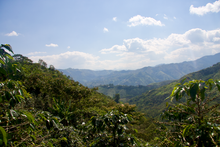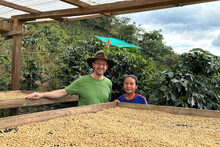
This silky coffee has sweet cola notes of caramel and spice, but with a delicate pomegranate on the aftertaste making for a balanced and elegant cup.
The Marshell varietal at the heart of this lot has a fascinating and somewhat mysterious origin story. Discovered in 2016 by Grimanes Morales Lizana, a coffee farmer in the municipality of San Ignacio, Peru, the Marshell tree looked distinctly different from other varieties cultivated in the area. The name was created using letters from the names and surnames of the family members of the woman producer who found it, honouring her father-in-law Marcelino. It is believed that the coffee is the result of a natural mutation of the Bourbon variety.
Marshell first captured international attention when it won the 2019 Cup of Excellence Peru, achieving a cupping score of 92.28 for Lizana's washed lot from her farm La Lucuma. In 1997 she had discovered the new variety but did not initially pay much attention to it. Then in 2011, her whole plantation was attacked by a disease commonly called "Ojo de pollo" and only this new variety survived, proving itself resistant. That resilience, combined with its exceptional cup quality, sparked widespread interest among Peruvian producers.
The potential for Marshell is immense because the flavour profiles score high in the cup while also being a tough varietal that can withstand the many diseases that plague coffee production. Known for its robustness, high yield, and impressive cup quality, the Marshell varietal thrives in the northern Peruvian regions, where it performs exceptionally well under local growing conditions. Producers in Cajamarca feel it is particularly suited to the area's microclimate and terroir.
Nima's lot is washed processed. Cherries are carefully picked at peak ripeness, depulped, and fermented before being washed and dried. The family has just invested in brand new raised drying beds, a significant commitment for a farm of their scale, but one that reflects their dedication to quality over quantity.
- Country: Peru
- Region: La Coipa, San Ignacio, Cajamarca
- Producer: Nima Juarez
- Farm: El Roble
- Farm Size: 3 hectares
- Variety: Marshell (natural Bourbon mutation, 2019 Cup of Excellence Peru winner)
- Process: Washed
- Drying: Raised beds
- Altitude: 1,720 m.a.s.l.
- Producer Group: Gallitos de las Rocas
- Partner: Origin Coffee Lab (Solidario program)
- FILTER RECIPE
- Suggested method: French Press
Dose: 32g
Water: 500ml / 96 °C
Time: 4-5 mins
To find the method that suits your kit, check out our Brew Guides.

Nima Juarez's three-hectare farm El Roble sits in La Coipa, within the San Ignacio province of Cajamarca. La Coipa is a uniquely prolific area on the border of the Jaén and San Ignacio districts, responsible for about 9% of Peru's total coffee production. The region's geography is dramatic: steep hillsides, limited infrastructure, and no electricity make coffee production here a genuinely challenging endeavour.
Nima, her husband, and their two children live at the centre of the farm with their dog Botas (named for his love of eating shoes). The farm is currently planted with Catuai, Bourbon, and Catimor. Although Catimor is easier to grow, the cup quality can be less impressive than other varietals, and Nima is keen to gradually plant more Bourbon and Catuai alongside her Marshell. This commitment to quality over convenience speaks to her vision for the farm's future: she is clear that lower quality, commodity coffee production will not provide for her family, but great quality coffee can.
Nima is part of the Gallitos de las Rocas producer group in La Coipa. The group takes its name from the Andean cock-of-the-rock, the national bird of Peru, known locally as tunki. The male has a large disk-like crest and brilliant scarlet or orange plumage, making it one of the most striking birds in the Andean cloud forests. It is a fitting symbol for a group of producers working to create something exceptional in challenging conditions.
Origin Coffee Lab works directly with producer groups in Peru through their Solidario program, giving producers access to training, financing, and feedback about coffee quality. For small-scale farmers like Nima, this support provides skills, quality insights, and finance, allowing them to continually improve their production and access the specialty market.
Without scale or infrastructure, the families in this area rely on themselves to solve basic challenges. Nima's family has found a spring on the farm to provide drinking water and grows a range of edible plants including banana and cassava. They also keep a small beehive by the drying tables housing native stingless bees, which not only provide delicious honey but also help pollinate the coffee plants.






